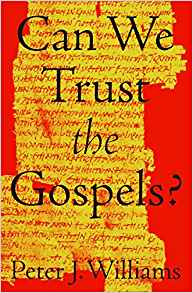
Lydia McGrew reviews a recent debate with Bart Ehrman, and argues that Bible scholar Peter J Williams offers a model for dispensing common sense – The Right Way to Debate Bart Ehrman
The hallmark of Williams’ responses to Ehrman was his use of common sense, both in presenting his own case and in responding to Ehrman’s objections. Williams’ case for the reliability of the Gospels in this debate is based in part upon a compendium of fascinating external confirmations, such as name statistics, measurements, and topography. Pace Ehrman, these small details do constitute evidence that, as Williams says in his book Can We Trust the Gospels?, the authors knew their stuff. The small, difficult things that the evangelists get right are all the more impressive given the major upheavals in social customs and culture in Palestine, and the dispersal of the inhabitants, after the destruction of Jerusalem in AD 70…
This emphasis on details is highly relevant to Ehrman’s attempts to characterize the Gospels as unreliable because they were, he says, written at multiple removes from the events they describe and hence corrupted over time by a “telephone game” process of transmission. In making this argument Ehrman repeatedly tries to emphasize the fact that the Gospels were written down several decades after their events. Williams rightly counters by pointing out that the Gospels do not have specific dates on them and that we should look at the evidences within them of their coming from those close to the events. Even though Luke, for example, was not an eyewitness of Jesus’ ministry, it does not follow that Luke recorded stories that had been repeated many times as in the telephone game–a point Ehrman repeatedly ignores.

Williams’ interaction with Ehrman is marked by not making unnecessary concessions to Ehrman’s skepticism. For example, when Ehrman alleges contradictions in the Gospels, Williams applies a real-world imagination to show how various accounts could reasonably all be true. For some reason, Ehrman chooses to take his stand on the references to Judas’s death in Matthew 27:5 and Acts 1:18, alleging an irreconcilable contradiction. Williams sensibly points out that Acts 1:18 itself is clearly incomplete, since one’s intestines would not normally burst out merely from falling. This point leaves open the real possibility that a rope burst and that Judas’ partially decayed body fell from a height, perhaps striking some object on the way down and hence falling prone. In this sense we can regard Matthew’s reference to hanging as explaining the reference in Acts to the unpleasant bursting of Judas’s body, and the two accounts are complementary. Williams does not insist on this particular scenario but points out that the data clearly underdetermine the precise nature of the events; hence, some conjecture is inevitable if we want to make a reasonable suggestion about what happened. Though Ehrman tries to portray this as a desperate measure undertaken under the grip of religious commitment, it should be obvious to the impartial viewer that it is instead a responsible approach to historical reconstruction.
History vs. ‘history’
I was glad to see Williams emphasizing that what is admitted to be true by history departments is often skewed by criteria that tend towards false negatives–judgements that something is not historical or authentic when it really is. Williams shrewdly points out that this skeptical bent in the discipline tends to punish false negatives lightly while punishing false positives heavily, and he even pointed out that this is true in areas other than Gospels scholarship. Hence, the reputation of a scholar who hastily judged the Dead Sea Scrolls to be inauthentic suffered very little, though a scholar who incorrectly accepted the Hitler diaries as authentic suffered much more heavily.
Here I would use some slightly different terminology from Williams’. Williams identifies history as what history departments do and hence says that he is not “doing history.” At the same time, he rejects the insinuation that he is relying on arational considerations. Instead, he argues that he is trying to discover what is rational to believe. I would word this point slightly differently. I would say that good history is rational history. Hence, Williams is doing the kind of thing that history departments should be doing even if they don’t do it, and in that sense he is doing history.
Williams also points out that the biases in historical Jesus scholarship are subtle but consistent. It is not, he emphasizes, so much a blatant anti-supernatural bias but rather a set of preferences and faulty standards that tend toward skepticism. This is an important point, since Ehrman and others will often imply that only a clear bias against the supernatural can be called a bias at all. I have said for some time that historical Jesus scholarship has baked in a set of anti-standards, including a preference for complex redactive or literary theories over commonsense theories. These biases also include the prejudicial treatment of harmonization as a religious practice–a characteristic Ehrman shares in full. Countering these faulty standards means doing better history…
The full analysis of the debate by Lydia McGrew is given below:
The Right Way to Debate Bart Ehrman - Peter Williams vs Bart Ehrman Nov 2019Lydia McGrew is an analytic philosopher and the author of The Mirror or the Mask: Liberating the Gospels From Literary Devices and Hidden in Plain View: Undesigned Coincidences in the Gospels and Acts.
Watch the full debate – Unbelievable? Peter J Williams and Bart Ehrman – Are the Gospels historically reliable?
Youtube Link- Peter J Williams & Bart Ehrman • The story of Jesus: Are the Gospels historically reliable?
Related Post: Why Affirm Biblical Inerrancy and Ignore Missing Original Manuscripts and Other Errors? Part 2: Debating with Bart Ehrman